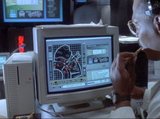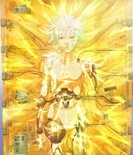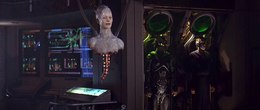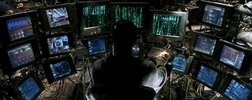1990s
-
Total Recall, Dir. Paul Verhoeven, 1990, 69/B. Based on a short story by P.K.D.: We Can Remember It for You Wholesale. Douglas Quaid/Hauser gets a memory implant of a Mars vacation at Total Recall. I like the scene in which a man tries to convince Quaid/Hauser that he is dreaming (while Quaid/Hauser feels wide awake). But Quaid/Hauser doesn't believe him after the man sweats (as if that would be a good reality test...I don't think so!).
Also has a tennis coach program/hologram, a robo taxi service, a vision of a populated Mars, terraforming, and behaviorism.
Ref: IMDb, MRQE, Wikipedia, Google Directory, Script.
Misc: Short Story Tech / Tech News, Ebert's Review: 3.5/4.
-
Terminator 2: Judgment Day (1991). See Terminator entry (1984).
-
 Jurassic Park, Dir. Stephen Spielberg, 1993, 75/B+. Based on the novel by Michael Crichton. Portrays gene sequence manipulation and an automated park. It discredits underground, undisciplined, and business driven attempts to manipulate the near infinite complexities of nature (Crichton pushes this theme in many of his novels, such as in The Andromeda Strain and Next, but he loves the traditional practice of science by academics like Einstein who had a conscience for any negative side effects of our scientific power).
Jurassic Park, Dir. Stephen Spielberg, 1993, 75/B+. Based on the novel by Michael Crichton. Portrays gene sequence manipulation and an automated park. It discredits underground, undisciplined, and business driven attempts to manipulate the near infinite complexities of nature (Crichton pushes this theme in many of his novels, such as in The Andromeda Strain and Next, but he loves the traditional practice of science by academics like Einstein who had a conscience for any negative side effects of our scientific power). I love the computer hacker scenes, the chaos theory wisecracks (but they are better in the book), all the sciency stuff whether in digging for bones or talking about plants, and the dinosaurs are cool.
I love the computer hacker scenes, the chaos theory wisecracks (but they are better in the book), all the sciency stuff whether in digging for bones or talking about plants, and the dinosaurs are cool.Ref: IMDb, MRQE, Wikipedia, Wikia, Google Directory, Script.
Misc: Complete Jurassic Park Encyclopedia, JP Database, JP Files, FAQ: JP Science.
-
 Ghost in the Shell (Kôkaku kidôtai) & Innocence (aka Ghost in the Shell 2: Innocence), Dir. Mamoru Oshii, 1995 (76/B+) & 2004 (70/B), Anime. Based on the manga of Masamune Shirow. Includes highly advanced androids, invisibility tech, mental implants for expanded access to the world's information, and sentient programs/ghosts. Both are serious anime movies with extraordinary visual and imaginative elements. They are influenced by Blade Runner in their tendency to question the line between humans and machines.
Ghost in the Shell (Kôkaku kidôtai) & Innocence (aka Ghost in the Shell 2: Innocence), Dir. Mamoru Oshii, 1995 (76/B+) & 2004 (70/B), Anime. Based on the manga of Masamune Shirow. Includes highly advanced androids, invisibility tech, mental implants for expanded access to the world's information, and sentient programs/ghosts. Both are serious anime movies with extraordinary visual and imaginative elements. They are influenced by Blade Runner in their tendency to question the line between humans and machines.But Oshii's Ghost in the Shell (GITS) movies have flashy contemporary-looking technology and eastern influences. Interestingly, his ghost/body dualism seems to extend to computer information or programs in a network. Oshii's visions often take place in what he calls 'borderline realms' (such as an Internet). In GITS-2 lookout for the memory hacking, loop traps, and humans as the birth of A.I.! It does have some long artsy sequences for songs and parades, witty speeches, and literary quotes in GITS-2.
Oshii enhanced and reissued his 1995 movie as Ghost in the Shell 2.0 (2008). He kept the same story, but tinkered with the original by adding new CGI. Some reviews mention that the new CGI doesn't seamlessly blend with the old artwork.
Ref: IMDb, MRQE, Wikipedia, Wikia, Google Directory, Transcripts (GITS / Innocence).
Misc: In the Shell, O'Ehley (Gives GITS 4/4, Innocence 3.5/4), Clips from GITS.
-
 Star Trek: First Contact, Dir. Jonathan Frakes, 1996, 73/B+. Includes nanotechnology, borgized people, various types of Borg implants, warp engines, and an android. It explores the importance of discovering intelligent alien life and the birth of Roddenberry's vision of the future. The Borg, a network of zombie-like drones with a collective-consciousness, use time travel to try to assimilate humans into their collective. Jonathan Frakes says he was influenced by 2001 in scenes like the zero gravity mission outside the ship (DVD commentary).
Star Trek: First Contact, Dir. Jonathan Frakes, 1996, 73/B+. Includes nanotechnology, borgized people, various types of Borg implants, warp engines, and an android. It explores the importance of discovering intelligent alien life and the birth of Roddenberry's vision of the future. The Borg, a network of zombie-like drones with a collective-consciousness, use time travel to try to assimilate humans into their collective. Jonathan Frakes says he was influenced by 2001 in scenes like the zero gravity mission outside the ship (DVD commentary).Ref: IMDb, MRQE, Wikipedia, Wikia, Google Directory, Script, Ebert's Review: 3.5/4.
Misc: Official Franchise Site, Top Trek Tech. News: Cellborg, Self Healing Tech.
-
 Contact, Dir. Robert Zemeckis, 1997, 69/B. Based on the novel by Carl Sagan. Smartly portrays themes concerning SETI, scientific inquiry, and science vs. religion. Includes computer aided radio astronomy equipment and a speculative alien space transporter. Computers are absolutely essential in this kind of radio astronomy and it usually takes supercomputers or cloud computing (see the SETI project at Berkeley for example) to make SETI projects possible.
Contact, Dir. Robert Zemeckis, 1997, 69/B. Based on the novel by Carl Sagan. Smartly portrays themes concerning SETI, scientific inquiry, and science vs. religion. Includes computer aided radio astronomy equipment and a speculative alien space transporter. Computers are absolutely essential in this kind of radio astronomy and it usually takes supercomputers or cloud computing (see the SETI project at Berkeley for example) to make SETI projects possible.It seems to mimic and improve the method of alien contact in This Island Earth and exudes a love for science. Would we cooperate enough on so large a scale to advance science and promote discovery? The book was Carl Sagan's first and only novel (and a huge bestseller at the time), coming after his very successful Cosmos series, and it contains much more scientific fascination and detail than the movie of course.
Ref: IMDb, MRQE, Wikipedia, Script.
Misc: Official Site, Fansite, Ebert's Review: 3.5/4, SETI.org's Comments, The Carl Sagan Portal, Space Hotel.
-
Gattaca, Dir. Andrew Niccol, 1997, 72/B. Presents a future in which we bestow reverence and rank (in the workplace and society) on those with a genetic predisposition and statistical likelihood to be the best. Quick samples of DNA (from blood, urine, or other bodily source) serve as primary identification, which further ties one's identity to genetics.
But the system turns into harsh discrimination (as the moralizing voice over will not let the viewer forget). Parents in this world get to choose desirable genes for their children to promote good health or artistic talent, which is important since everyone has personalized gene analysis reports that guide their social worth and options. One must have the right genes to become an astronaut, for example.
Ethan Hawke's character strives to qualify for space missions despite his genetic limits. His struggle and character growth (through hard work and flexibility) demonstrates our unique human ability to adapt and overcome genetic predispositions and social obstacles. Humans really are clever sometimes! But perhaps we are clever enough to consider more variables than just genes, making parts of the scenario implausible.
Ref : Technovelgy News, IMDb, MRQE, Wikipedia, Google Directory, Script.
Misc: Ebert's Review: 3.5/4, Study Guide, Human Genome Project, Genetics.
-
Dark City, Dir. Alex Proyas, 1998, 74/B. Strangers perform experiments on unknowing humans to find the basis of individuality. I think it would have been an excellent idea for an alien invader type episode in Star Trek (it wouldn't look so out of place anyways)! Ref: IMDB, MRQE, Wikipedia, Google Directory, Script.
-
eXistenZ, Dir. David Cronenberg, 1999, 67/B-. See the novel by Christopher Priest. This smart movie deals with the human side effects of using bio-machine video games. It lampoons video game antics (e.g., timeouts until predefined keywords are given), and has its characters slowly get desensitized and confused between rules in virtual reality and moral rules in reality. It's best for fans of Cronenberg. Ref: IMDb, MRQE, Wikipedia, Google Directory.
-
 The Matrix Trilogy, Dir. The Wachowski Brothers, 1999-2003. Just for starters it includes a computer simulated reality program, training and educational programs zapped straight to human memory, hover crafts, EMPs (Electro-Magnetic Pulses), and many designs of machines. Or it's simply the green coded world, with lots of martial arts & gunfights!
The Matrix Trilogy, Dir. The Wachowski Brothers, 1999-2003. Just for starters it includes a computer simulated reality program, training and educational programs zapped straight to human memory, hover crafts, EMPs (Electro-Magnetic Pulses), and many designs of machines. Or it's simply the green coded world, with lots of martial arts & gunfights!The first movie is a likely SF classic, and the second tells us more about the matrix world. Watch for all the philosophical questions (such as skepticism, freewill, self-knowledge, dualism, Neo as ubermensch), the idea that the human mind can be hacked into just like a computer, causation themes, machine superiority against human resistance, and human reliance on machines.
Ref: IMDb, MRQE, Wikipedia, Wikia, Google Directory, Scripts.
Misc: Whatisthematrix Official Site / Philosophy, Ebert Gives Reloaded 3.5/4, Last Free City, Matrix Explained, Nmap, Strange New World, Metaphilm, Matrix Philosophy.
-
The Thirteenth Floor, Dir. Josef Rusnak, 1999, 56/C. Based on a novel by Daniel F. Galouye: Simulacron 3. Includes sentient programs/humans. Explores questions regarding the nature of intelligence and identity of digital-machines and humans, limits to our knowledge of ultimate Reality, and possible multiple levels of reality: could we discover our 'reality' to be a virtual reality? Ref: IMDb, MRQE, Wikipedia.
Other 1990s SF and Related Movies
- Quick mentions (future possible entries): Star Trek VI: The Undiscovered Country (Dir. Nicholas Meyer, 1991), The Lawnmower Man (Dir. Brett Leonard, 1992), Stargate (Dir. Roland Emmerich, 1994), Hackers (Dir. Iain Softley, 1995), Johnny Mnemonic (Dir. Robert Longo, 1995), Strange Days (Dir. Kathryn Bigelow, 1995), Virtuosity (Dir. Brett Leonard, 1995), Starship Troopers (Dir. Paul Verhoeven, 1997), Bicentennial Man (Dir. Chris Columbus, 1999).
-
Cube, Dir. Vincenzo Natali, 1997. The horrific quest of 7 strangers to avoid lethal traps in a huge cube. The characters have witty lines (expressing skepticism over teleological explanations). And they use mathematics and practical caution to find a way out. The commentary notes the influence of Tarkovsky's Stalker (1979), where Cube seems to get its focus on mystery and the ultimate lack of explanation for the strange 'cube activities' (we never find out the cube's purpose, its designer, or its manager). (Stalker is a mesmerizing film, but its zone with a breakdown in the laws of nature is pure fantasy and the polar opposite of SF. It isn't clear whether anything in Cube overtakes the possibility for SF like in Stalker.) Ref: IMDB, MRQE, Wikipedia, Google Directory, Script.
-
Twelve Monkeys, Dir. Terry Gilliam, 1996, 76/B+. Bruce Willis’s character, Cole, becomes disoriented due to his several time traveling trips (as in Marker's classic short La Jetee), but he has difficulty trusting the truth or falsity of his memories. Portrays interesting psychological aspects of time travel and memory. Ref: IMDB, MRQE, Wikipedia, Google Directory, Script.
-
Open Your Eyes, Alejandro Amenábar, 1997. A flawed cryogenics program turns into a nightmare. Inspired the remake Vanilla Sky (2001). Ref: IMDB, MRQE, Wikipedia. Misc: Watch it free at IMDB.
-
Pi, Dir. Darren Aronofsky, 1998, 73.5/B+. Aronofsky uses nauseous camera work to emphasize the negative psychological consequences that a mathematician (Maximilian Cohen) experiences (due to the flux and chaos in nature all around him, says the back cover of the DVD) as he searches for law-like patterns in the stock market and in the bible. I think it's closer to mysticism than science, but so were many of the ideas of Kepler (even crazy ideas can accidentally lead to advances in science). Ref: IMDB, MRQE, Wikipedia, Google Directory. Misc: Official Site.
 We are looking for people with skills or interest in the following areas:
We are looking for people with skills or interest in the following areas:
